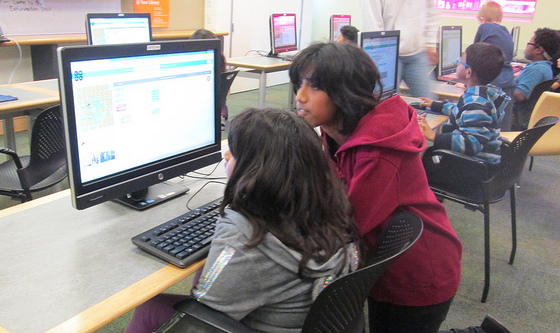Who Wants to Teach the World to Code—And Why?
/
Microsoft found some troubling statistics that made it sit up and take notice: Less than 25 percent of U.S. high schools offer computer science classes and only 2.5 percent of college graduates earn four-year degrees in computer science—and among those, only one in five are female. With an interest in improving computer science education and guided by the notion that a single spark of opportunity can inspire a child to shine brightly, Microsoft launched the $500 million global initiative YouthSpark in 2012.
We wrote last year about a $7.3 million grant from this program that benefitted the Children’s Home Society of Florida by developing tech skills among disadvantaged youth as well as improving child welfare systems in the Sunshine State. That was just one program funded by Microsoft’s renewed commitment of an additional $75 million in 2015. Now, Microsoft Philanthropies has announced a round of YouthSpark grants to 100 nonprofit partners in 55 countries.
Related:
- How this Tech Giant is Helping Disadvantaged Youth Build Skills for the Global Economy
- Tech for All: A Corporate Funder Doubles Down on Computer Science Education
The first thing that jumps out about these latest grants is their geographic breadth. Most corporate STEM funders we track are super-focused on building up such skills in the United States, with an eye toward meeting their future domestic workforce needs without endless begging for more H-1B visa slots. Microsoft is unusual among companies in thinking globally about the STEM challenge, and YouthSpark has a far lower quotient of enlightened self-interest than most STEM philanthropy we look at. This program focuses on creating opportunity for young people worldwide, and sees tech skills as a key path to the middle class.
“We know that no single organization or company can close the global computer science education skills gap,” Mary Snapp, corporate vice president and head of Microsoft Philanthropies, said in the grant announcement. “Our efforts have focused on leveraging longstanding community relationships of more than 100 nonprofit partners around the world to create access to computer science, and also to break down barriers and stereotypes that are keeping large populations of youth out of computer science education — even when the opportunities are available.”
Microsoft is especially interested in funding organizations that serve girls, minorities and low-income communities. One YouthSpark recipient is Laboratoria, a web development academy with four offices in Latin America, which empowers and educates young women seeking to break into the tech sector. In the United States, YouthSpark partners with a national service organization, City Year, that trains and deploys young adults through the AmeriCorps program.
“Partnerships with organizations that have the same mission we do are how we can add the most value, so we looked for organizations — like Laboratoria, CoderDojo and City Year — that know how to work well with kids, have a background in technology skills training, and understand the importance of computer science in preparing young people for a whole range of careers,” said Yvonne Thomas, Microsoft Philanthropies director.
A few months ago, we covered President Obama’s efforts to wrangle corporate partners to promote computer science education. Naturally, Microsoft’s work in this area topped the list of private sector philanthropy, along with commitments from Google, the Cartoon Network and other companies. Oracle recently announced its participation with a $200 million investment in computer science education. President Obama’s Computer Science for All initiative stated his belief that access to computer science education is critical to keep Americans competitive in the global economy. The White House estimates that within two years, 51 percent of STEM jobs will be in computer science-related fields.
Related:








